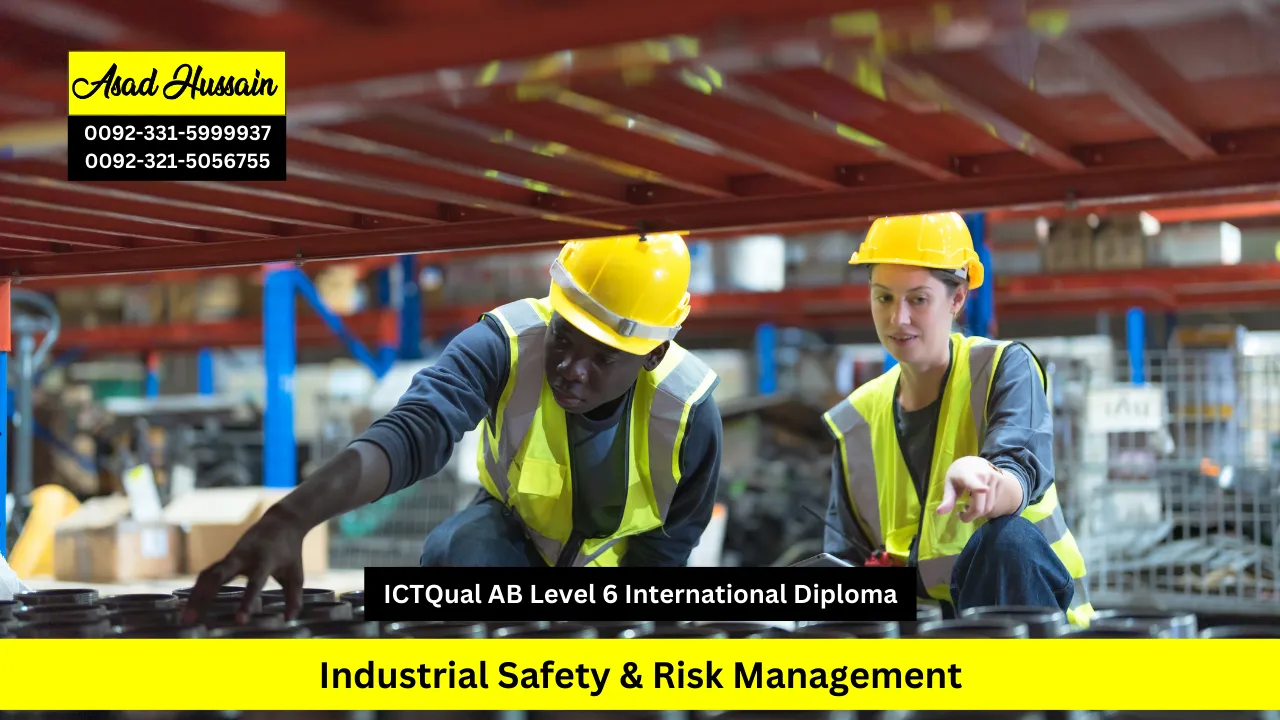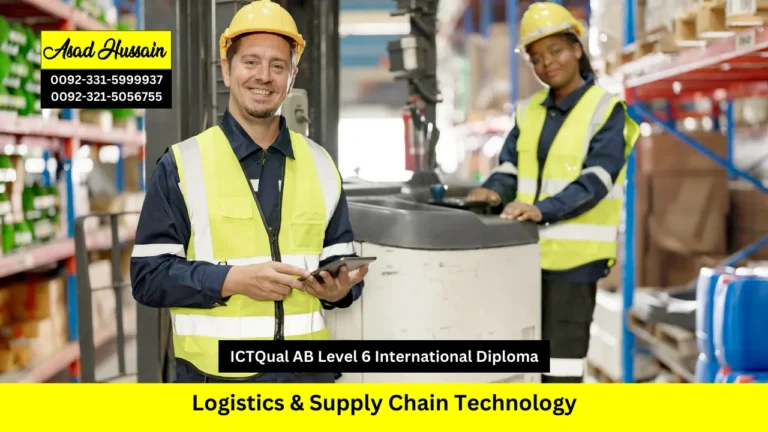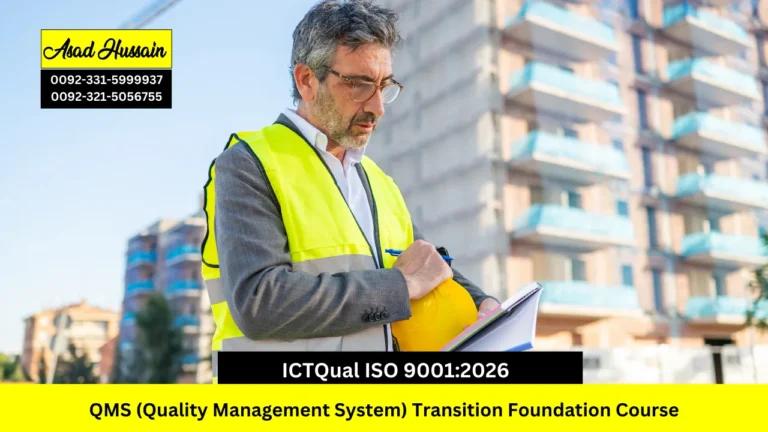n today’s rapidly evolving industrial landscape, ensuring workplace safety and effectively managing operational risks are critical priorities for organizations across all sectors. The ICTQual AB Level 6 International Diploma in Industrial Safety & Risk Management equips professionals with the advanced knowledge and practical skills necessary to prevent accidents, minimize hazards, and promote a culture of safety in complex industrial environments.
ICTQual ABLevel 6 International Diploma in Industrial Safety & Risk Management is designed for individuals seeking to excel in safety management, risk assessment, and regulatory compliance. Participants will gain in-depth insights into industrial safety standards, hazard identification, risk mitigation strategies, emergency response planning, and legal and ethical responsibilities in occupational settings. Through a combination of theoretical frameworks, case studies, and practical projects, learners will develop the ability to design, implement, and monitor effective safety management systems tailored to diverse industrial contexts.
By completing this diploma, learners will be prepared to take on senior roles in health, safety, and risk management, including positions such as Safety Officer, Risk Consultant, Industrial Safety Manager, and Compliance Coordinator. The course also emphasizes real-world applications, ensuring that graduates can make informed, evidence-based decisions that enhance operational efficiency while safeguarding personnel and assets.
This British Council verifiable, MOFA and Embassy attestable certification is globally recognized and highly valued by employers, making it an excellent choice for professionals aiming to advance their careers in industrial safety and risk management. Whether you are entering the field or seeking to formalize and expand your expertise, this diploma provides the practical knowledge and strategic understanding required to excel in today’s high-demand industrial environments.
Program Highlights
Study Units
Year 1 – Foundation of Industrial Safety & Risk Management
- Principles of Industrial Safety Management
- Introduction to Risk Management in Industrial Environments
- Occupational Health and Industrial Hygiene Fundamentals
- Workplace Hazards Identification and Control Measures
- Safety Legislation and Regulatory Compliance
- Fire Safety and Emergency Preparedness
- Manual Handling and Ergonomic Safety
- Communication and Reporting in Safety Management
- Introduction to Environmental Safety and Sustainability
- Electrical and Mechanical Safety Awareness
- Incident Investigation and Root Cause Analysis
- Professional Ethics and Responsibility in Safety Practice
Year 2 – Applied Industrial Safety & Risk Management
- Advanced Risk Assessment and Hazard Control
- Safety Performance Monitoring and Auditing
- Process Safety Management and Hazardous Substances
- Industrial Safety in Manufacturing and Heavy Industries
- Safety Management in Construction and Energy Sectors
- Occupational Diseases and Preventive Measures
- Behavioural Safety and Human Factors
- Safety Culture Development and Change Management
- Safety Technology and Digital Tools
- Emergency Response Planning and Crisis Management
- Legal and Regulatory Frameworks (International Perspective)
- Research Methods and Data Analysis for Safety Management
Year 3 – Strategic Leadership in Industrial Safety & Risk Management
- Strategic Safety Leadership and Governance
- Integrated Management Systems (ISO 45001, ISO 14001, ISO 9001)
- Business Risk Management and Sustainability
- Advanced Occupational Health & Wellbeing Strategies
- Safety in Large-Scale Industrial Projects
- Corporate Social Responsibility and Ethical Safety Practices
- International Standards and Global Safety Frameworks
- Digital Transformation and Emerging Trends in Safety
- Policy Development and Implementation in Safety Management
- Research Project / Dissertation in Industrial Safety
- Professional Development and Lifelong Learning
- Capstone Project: Practical Application of Safety Leadership
To ensure participants gain maximum benefit from the ICTQual AB Level 6 International Diploma in Industrial Safety & Risk Management, applicants must meet specific entry requirements. These requirements are designed to confirm that learners have the foundational knowledge, practical experience, and language proficiency necessary to successfully complete this advanced program.
1. Age Requirements
- Applicants must be at least 18 years old to inroll in ICTQual ABLevel 6 International Diploma in Industrial Safety & Risk Management.
- Younger candidates with exceptional professional experience in industrial safety may be considered on a case-by-case basis.
2. Educational Requirements
- A minimum of a Level 5 qualification or equivalent in Occupational Health & Safety, Industrial Safety, Engineering, or a related field is required.
- Candidates with relevant vocational training or diplomas in Industrial Safety, Risk Management, or Health & Safety will also be considered.
3. Professional Experience
- At least 2 years of work experience in industrial safety, risk assessment, or related operational roles is highly recommended to apply theoretical knowledge practically.
- Experience in supervisory or managerial roles within industrial, manufacturing, or construction environments will strengthen the application.
4. English Language Proficiency
- Applicants must demonstrate proficiency in English through qualifications such as IELTS 5.5+, TOEFL, or equivalent, ensuring they can comprehend course materials and communicate effectively.
- Candidates with work experience in English-speaking industrial environments may be considered without formal language testing.
Meeting these entry requirements ensures that learners are fully prepared to engage with the course content, participate in practical projects, and successfully achieve the globally recognized ICTQual AB Level 6 certification, enhancing career opportunities in industrial safety and risk management.
The ICTQual AB Level 6 International Diploma in Industrial Safety & Risk Management equips learners with advanced knowledge, practical skills, and leadership competencies to identify, assess, and mitigate industrial risks while ensuring workplace safety and compliance. This program integrates theoretical foundations, applied practices, and strategic management to prepare learners for senior roles in safety management across industries.
Year 1 – Foundation of Industrial Safety & Risk Management
Principles of Industrial Safety Management
- Understand core principles and frameworks of industrial safety.
- Apply safety management techniques to minimize risks.
- Evaluate safety programs using measurable performance indicators.
Introduction to Risk Management in Industrial Environments
- Identify potential hazards and risks in industrial settings.
- Apply risk assessment methodologies to control and mitigate hazards.
- Assess effectiveness of risk control strategies using measurable criteria.
Occupational Health and Industrial Hygiene Fundamentals
- Understand occupational health principles and hygiene practices.
- Apply preventive measures to protect worker health.
- Evaluate occupational health performance using measurable standards.
Workplace Hazards Identification and Control Measures
- Identify chemical, physical, and biological workplace hazards.
- Apply control measures to minimize risk exposure.
- Assess hazard mitigation effectiveness through measurable outcomes.
Safety Legislation and Regulatory Compliance
- Recognize national and international safety laws and regulations.
- Apply compliance strategies in industrial operations.
- Evaluate adherence to regulatory standards using measurable indicators.
Fire Safety and Emergency Preparedness
- Develop fire prevention and emergency response strategies.
- Apply firefighting techniques and emergency protocols.
- Assess preparedness and response efficiency using measurable criteria.
Manual Handling and Ergonomic Safety
- Implement ergonomic practices to reduce workplace injuries.
- Apply manual handling techniques in industrial environments.
- Evaluate safety improvements through measurable performance metrics.
Communication and Reporting in Safety Management
- Develop strategies for effective safety communication.
- Apply reporting standards for incidents and safety performance.
- Assess effectiveness of communication and reporting practices.
Introduction to Environmental Safety and Sustainability
- Understand environmental safety principles and sustainable practices.
- Apply sustainable approaches to minimize industrial environmental impact.
- Evaluate environmental performance using measurable standards.
Electrical and Mechanical Safety Awareness
- Identify electrical and mechanical hazards in industrial environments.
- Apply preventive measures and safety protocols.
- Assess compliance and effectiveness using measurable criteria.
Incident Investigation and Root Cause Analysis
- Conduct investigations to identify causes of workplace incidents.
- Apply root cause analysis techniques to prevent recurrence.
- Evaluate investigation outcomes using measurable standards.
Professional Ethics and Responsibility in Safety Practice
- Apply ethical principles in safety management decision-making.
- Ensure accountability in operational and leadership practices.
- Assess adherence to professional and ethical standards.
Year 2 – Applied Industrial Safety & Risk Management
Advanced Risk Assessment and Hazard Control
- Conduct comprehensive risk assessments using advanced techniques.
- Apply control measures to mitigate complex hazards.
- Evaluate risk management effectiveness using measurable indicators.
Safety Performance Monitoring and Auditing
- Implement safety monitoring and auditing frameworks.
- Apply performance measurement techniques to improve safety outcomes.
- Evaluate audit results and implement corrective actions.
Process Safety Management and Hazardous Substances
- Apply process safety principles in handling hazardous materials.
- Implement safety protocols to prevent industrial accidents.
- Assess compliance and risk reduction effectiveness.
Industrial Safety in Manufacturing and Heavy Industries
- Develop safety strategies for manufacturing and heavy industry operations.
- Apply hazard control and safety procedures.
- Evaluate operational safety using measurable standards.
Safety Management in Construction and Energy Sectors
- Apply safety management principles in construction and energy industries.
- Implement industry-specific hazard prevention techniques.
- Evaluate safety program effectiveness using measurable criteria.
Occupational Diseases and Preventive Measures
- Identify common occupational diseases and their causes.
- Apply preventive strategies to minimize risks.
- Assess health outcomes using measurable performance indicators.
Behavioural Safety and Human Factors
- Analyze human behavior and its impact on workplace safety.
- Implement behavioral safety programs to reduce incidents.
- Evaluate effectiveness of interventions using measurable metrics.
Safety Culture Development and Change Management
- Develop a proactive safety culture within organizations.
- Apply change management techniques to enhance safety compliance.
- Assess cultural transformation using measurable outcomes.
Safety Technology and Digital Tools
- Utilize digital tools and technologies for safety monitoring.
- Apply software solutions for risk assessment and reporting.
- Evaluate effectiveness of technology in improving safety performance.
Emergency Response Planning and Crisis Management
- Develop comprehensive emergency response plans.
- Apply crisis management strategies in industrial scenarios.
- Evaluate response efficiency and readiness using measurable standards.
Legal and Regulatory Frameworks (International Perspective)
- Understand global safety standards and regulations.
- Apply international safety compliance strategies.
- Evaluate adherence to international standards using measurable indicators.
Research Methods and Data Analysis for Safety Management
- Conduct applied research in industrial safety contexts.
- Apply quantitative and qualitative methods for decision-making.
- Evaluate research outcomes using measurable performance standards.
Year 3 – Strategic Leadership in Industrial Safety & Risk Management
Strategic Safety Leadership and Governance
- Develop strategic plans for organizational safety management.
- Apply governance frameworks for compliance and efficiency.
- Assess strategic outcomes using measurable indicators.
Integrated Management Systems (ISO 45001, ISO 14001, ISO 9001)
- Implement integrated safety, quality, and environmental management systems.
- Apply ISO standards in operational and strategic processes.
- Evaluate system effectiveness using measurable performance metrics.
Business Risk Management and Sustainability
- Integrate safety management with overall business risk strategies.
- Apply sustainability principles to organizational operations.
- Evaluate effectiveness using measurable indicators.
Advanced Occupational Health & Wellbeing Strategies
- Develop programs to enhance occupational health and wellbeing.
- Apply preventive and proactive strategies for workforce safety.
- Assess program outcomes using measurable standards.
Safety in Large-Scale Industrial Projects
- Implement safety management practices in large industrial projects.
- Apply risk assessment and mitigation strategies.
- Evaluate project safety performance using measurable criteria.
Corporate Social Responsibility and Ethical Safety Practices
- Integrate ethical practices into organizational safety programs.
- Apply CSR strategies to enhance workplace and community safety.
- Assess impact using measurable outcomes.
International Standards and Global Safety Frameworks
- Apply global safety standards in industrial operations.
- Benchmark organizational practices against international frameworks.
- Evaluate compliance and performance using measurable metrics.
Digital Transformation and Emerging Trends in Safety
- Implement emerging technologies for advanced safety management.
- Apply digital transformation strategies to enhance operational safety.
- Evaluate effectiveness using measurable standards.
Policy Development and Implementation in Safety Management
- Develop and implement safety policies for organizational compliance.
- Apply best practices to operational and strategic processes.
- Evaluate policy outcomes using measurable criteria.
Research Project / Dissertation in Industrial Safety
- Conduct independent research on contemporary safety challenges.
- Apply analytical and problem-solving skills to practical safety issues.
- Present research findings using measurable professional standards.
Professional Development and Lifelong Learning
- Develop strategies for continuous learning in safety leadership.
- Apply professional growth techniques to enhance expertise.
- Evaluate personal development using measurable standards.
Capstone Project: Practical Application of Safety Leadership
- Integrate knowledge, skills, and competencies from all units into a practical project.
- Apply strategic, operational, and leadership competencies to solve real-world safety challenges.
- Evaluate project success using measurable performance and safety indicators.
Upon completion, learners will possess advanced technical knowledge, practical skills, and leadership competencies to manage industrial safety, mitigate risks, and lead organizational safety initiatives effectively across diverse industries globally.
The ICTQual AB Level 6 International Diploma in Industrial Safety & Risk Management is designed for a wide range of learners who aspire to develop advanced knowledge, practical skills, and professional competencies in industrial safety, risk management, and compliance. This course caters to individuals from diverse professional and educational backgrounds who aim to make a meaningful impact in workplace safety and risk mitigation.
Educational Instructors and Trainers
- Professionals who teach or train in occupational health, safety, or industrial management can enhance their instructional skills with updated safety frameworks and risk management techniques.
- Gain the ability to design practical training programs and deliver courses that align with global safety standards.
Environmental Advocates and Activists
- Individuals promoting workplace sustainability and environmental safety will learn how to integrate environmental protection into industrial safety practices.
- Acquire skills to monitor industrial operations, reduce environmental hazards, and promote sustainable practices effectively.
Students and Recent Graduates
- Students seeking to enter the industrial safety and risk management field will gain advanced, industry-relevant knowledge and certifications.
- Develop practical skills that enhance employability and prepare them for professional roles such as Safety Officer, Risk Analyst, or Compliance Coordinator.
Career Changers
- Professionals looking to transition into industrial safety or risk management roles will gain comprehensive knowledge to succeed in a new career.
- Learn to apply safety standards, risk assessment strategies, and compliance measures in diverse industrial environments.
Policy Makers and Regulators
- Individuals involved in designing, implementing, or enforcing workplace safety and risk regulations will develop expertise in legal frameworks, compliance auditing, and risk mitigation.
- Gain practical insights to influence safety policies, improve regulatory enforcement, and ensure organizational adherence to standards.
This diploma ensures that learners from all backgrounds—whether educators, environmental advocates, students, career changers, or regulators—acquire the technical knowledge, strategic thinking, and practical skills necessary to lead industrial safety initiatives, implement risk management strategies, and create safer, more compliant work environments globally.







